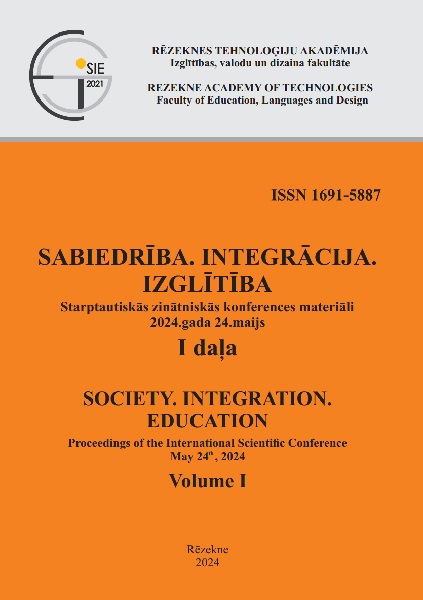MASTER'S DEGREE IN LAW - PER ASPERA AD ASTRA BALTIC APPROACH
DOI:
https://doi.org/10.17770/sie2024vol1.7811Keywords:
Centralized qualification exam, competences, examination methodology, legal education, transformations in the Higher Education, the Baltic StatesAbstract
The purpose of this article is to continue the discussion of experts and academic representatives on the necessary knowledge and examination formats in law studies in order to achieve the goal: providing the education of highly qualified lawyers to fully and responsibly implement the rule of law in democratic countries. Authors highlight the current trends and novelties in the Baltic States, which illustrate the transformation of the attitude of legislators and policymakers and the steps taken to ensure the highest standards in learning the legal profession. The article illustrates the differences in the procedure for obtaining a master's degree in Latvia, Lithuania and Estonia, which is related to the introduction of the national unified legal professional qualification exam in Latvia in 2021. The article summarizes the opinions of three academic staff and legal professionals from the Baltic States on how the master's degree acquisition process existing in the country provides guarantees for graduates' acquisition of quality education and the necessary professional skills.
References
Bileišis, M., Beinoravičius, D., Vainiutė, M. (2015). Teisės specialistų rengimas Lietuvos valstybės tarnybos modernizavimo kontekste (Challenges to Legal Education in the Context of Lithuania’s Civil Service Modernization). Viešoji politika ir administravimas. T. 14, Nr. 4 / 2015, Vol. 14, No 4, p. 625–638.
CC. (2002). Constitutional Court of Latvia, Decision. 04.06.2002. Case No 2001-16-01. On Compliance of the Requirement, Incorporated into the Public Procurator’s Office Law (Section 33(1)) the Republic of Latvia Advocacy Law (Para 3 of Section 14) and Notariate law (Para 3 of Section 9), Envisaging the Necessity of Opinion by the Faculty of Law of the University of Latvia with Articles 91 and 106 of the Satversme of the Republic of Latvia.
EXLEX. (2022). Law on Legal examination. Draft. law no. 23-0207. Retrieved from: https://eelnoud.valitsus.ee/main/mount/docList/d40a94f8-4b17-4780-a28d-2940c7aaa232#qUp6byoU
JUREE. (2022). Intention to develop a regulation on the bar exam. Initiated 07.03.2022. Retrieved from: https://eelnoud.valitsus.ee/main#aRJDtkvb
JV. (2023). Valsts vienotā jurista profesionālās kvalifikācijas eksāmena normatīvais regulējums un statistika. (Normative regulation and statistics of the state uniform professional qualification exam for lawyers). Jurista Vārds, 05.12.2023., Nr. 49 (1315), 13.-14.lpp.
KEE. (2021). Konverents „Eesti õigushariduse tulevik“ (Conference "The Future of Estonian Legal Education"). Retrieved from: https://oigus-selts.ee/konverentsid/konverents-eesti-oigushariduse-tulevik
Kõve, V., Pilving, I., Andresen E. (2021). Pöördumine: õigushariduse ja õigusteenuse kvaliteedi tõstmise vajadusest. Riigikohus. 7. juuni 2021 (Appeal: on the need to improve the quality of legal education and legal services. Supreme Court,). Retrieved from: https://www.riigikohus.ee/et/uudiste-arhiiv/poordumine-oigushariduse-ja-oigusteenuse-kvaliteedi-tostmise-vajadusest
Kriviņš, A. (2023). Higher Education Of Lawyers: The Centralized Qualification Exam. In: Society. Integration. Education Proceedings of the International Scientific Conference. Volume I, May 26th, 2023. 40-49.
LRKT. (2008). Court of Lithuania, Case No 2008-02-20, Byla Nr. 19/05.
Madise, Ü. (2023). Arvamus juristieksami seaduse eelnõu kohta. Õiguskantsleri Kantselei. (Opinion on the draft law on the bar exam. Chancellor of Justice's Office). Retrieved from: https://www.oiguskantsler.ee/sites/default/files/field_document2/Arvamus%20juristieksami%20seaduse%20eeln%C3%B5u%20kohta.pdf
Madise, Ü. (2011). Milleks on Eestis vaja ülikoole? (Why do we need universities in Estonia?). Retrieved from: https://www.sirp.ee/s1-artiklid/c9-sotsiaalia/milleks-on-eestis-vaja-uelikoole/
TMLV. (2023). Tieslietu ministrija. Valsts vienotais jurista profesionālās kvalifikācijas eksāmens (Ministry of Justice, Latvia. Unifоrm stаtе prоfеssiоnаl quаlifiсаtiоn exаminаtiоn оf а lаwyеr). Retrieved from: https://www.tm.gov.lv/lv/eksamens
Pasvenskiene, A., Astromskis, P. (2020). The Future of Legal Education: Do Law Schools Have the Right to Be Conservative? Baltic Journal of Law & Politics, 13(1), p.191-217, 206 – 207.
Riigikohus, (2021). Eesti õigushariduse ja juristikutse probleemidest ning võimalikest lahendustest. Analüüsi kokkuvõte. (Problems and possible solutions in Estonian legal education and the legal profession. Summary of the analysis. Supreme Court.) Retrieved from: https://www.riigikohus.ee/sites/default/files/elfinder/dokumendid/Oigusharidusest_3%2005%202021%20l%C3%BChem.pdf
MJEE. (2022). Justiitsministeerium Riiklik juristieksam aitab ühtlustada õigushariduse taset. Ministry of Justice, Estonia. A national law exam will help to harmonise the level of legal education. Retrieved from: https://www.just.ee/uudised/riiklik-juristieksam-aitab-uhtlustada-oigushariduse-taset
Ziemele I., (2023). Valsts vienotā jurista profesionālās kvalifikācijas eksāmena nozīme un izaicinājumi. The importance and challenges of the national unified legal professional qualification exam. Jurista Vārds, Nr. 49 (1315), 12.-13.lpp.






